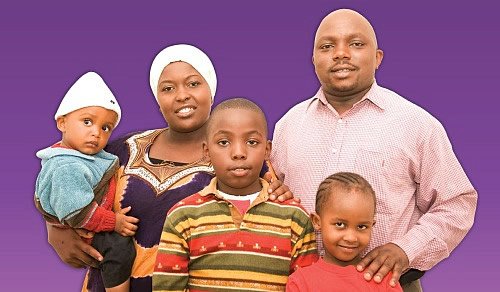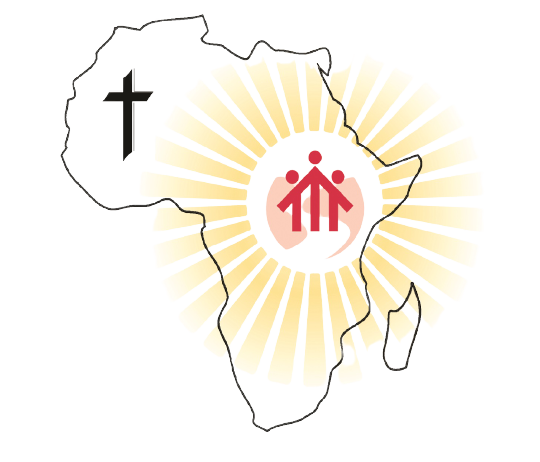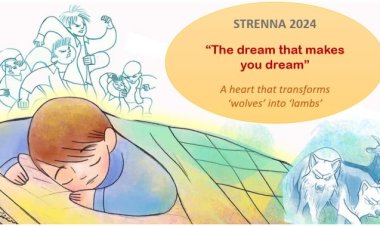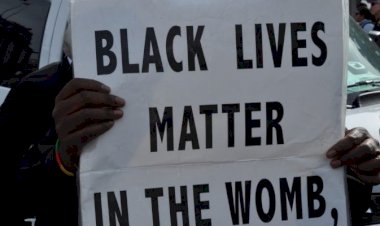The Missing SDG – promoting family and fatherhood
Seventeen Sustainable Development Goals (SDGs) were identified and committed to by the members of the UN, with the aim of ensuring their implementation by 2030. Sadly, neither the family nor the need to restore the role of fatherhood, which is so essential, were considered important enough to be included. Yet it would be by supporting the family unit, the basic cell of society, and promoting responsible fatherhood, that societies would go a long way to attaining those objectives.

The Missing SDG – promoting family and fatherhood
In 2015, Seventeen Sustainable Development Goals (SDGs) were identified and committed to by the members of the UN, with the aim of ensuring their implementation by 2030. Sadly, neither the family nor the need to restore the role of fatherhood, which is so essential, were considered important enough to be included. Yet if we examine the first five goals, it would be by supporting the family unit, the basic cell of society, and promoting responsible fatherhood, that societies would go a long way to attaining those objectives.
GOAL 1: No Poverty GOAL 2: Zero Hunger GOAL 3: Good Health and Well-being
GOAL 4: Quality Education GOAL 5: Gender Equality
The Roman statesman Cicero, who died in 43BC, described marriage as “the first and essential bond of society”. It is the natural institution that provides what every child needs and is entitled to: both a father and a mother. Nothing is more urgent for society than meeting this need. Unfortunately, the impression is growing that modern society can manage without fathers, if not families. However, more and more studies are revealing the indispensable role of fathers in the education and healthy growth of children.
Father’s Day, celebrated around the world, conveys the universal importance of fathers to their families and the lives of their children, just as mother’s day does regarding motherhood. However,
in an article entitled - “The Proof is in: Father Absence Harms Child Well-Being,” one anthropologist summarized a study by sociologists from 3 respected US universities - Princeton, Cornell, and UC Berkeley: “For many of our most intractable social ills affecting children, father absence is to blame!” When fathers fail to assume their proper role, children flounder. There is a ‘father factor’ in nearly all of the societal ills facing every society today.
The most consequential social trend of our time is prevalence of ‘father absence’ in the lives of children. Father absence is not just a problem for single mothers and their children. It is an international human problem and crisis which needs to be prioritised. In the meantime, the notion of fatherhood or any association with the idea of “patriarchy”, is under attack these days. The father figure is seen as an overbearing character, who has for too long abused his power. Like all symbols of authority, he must be overthrown.
BUT…
A consensus is emerging in the social sciences that one of the worst handicaps a child can face is the absence from the family of a father figure. Although it would be wrong to assume all children of single mothers are going to be damaged goods, it is clearly an impediment to integral personal development. Even those who are ideologically unsympathetic to traditional family patterns are forced to recognise this.
International and local research on children’s development suggests that the presence of a father contributes to cognitive development, intellectual functioning, and school achievement. Children growing up without fathers are more likely to experience emotional disturbances and depression. Girls growing up with their fathers are more likely to have higher self-esteem, lower levels of risky sexual behaviour, and fewer difficulties with romantic relationships later in life. They have less likelihood of an early pregnancy, bearing children outside marriage, marrying early, or getting divorced. Boys growing up in absent father households are more likely to display ‘hyper-masculine’ behaviour, including aggression. The influence of a father is both indirect and direct. The indirect influence includes support for the mother as well as influencing all major decisions regarding health, well-being and education of children. A father’s influence is direct in terms of educational level or length of time spent in school, educational achievement, self-confidence, especially among girls, as well as adjustment and behaviour control among boys.
Children who live with their fathers are more likely to have both good physical and emotional health, to achieve academically, and to avoid drugs, violence, and delinquent behaviour. Fathers have a powerful and positive impact upon the development and health of children. Fathers are far more than just ‘second adults’ in the home. Fathers who play their part, bring positive benefits to their children that no other person is as likely to bring.
Why is fatherhood in such a crisis, and what can we do about it?
It has often been assumed that the main problems of single parents were due to poverty, and the simple solution was for single mothers to be provided a home and enough money to live on. This has at times even become an “incentive” to adopt a line of action that will attract those benefits; in effect, to deliberately produce ‘fatherless’ children, who will be supported by the state. In some countries a single parent may apply for child grants, while a married couple is not entitled to such assistance!
We need to realize that society is stronger when men and women both play an equal role, and that it is not in anyone’s interest to disregard either. Further, we should be encouraging and supporting strong and committed families by reducing the incentives in welfare systems and in family legislation lead to the undermining of any motive to get married, and instead develop policies which encourage the formation and sustenance of wholesome family units with a mother and a father.
Statistics with respect to the birth of children out of wedlock, of the decrease in marriages, of the increase in dysfunctional family units, of the exponential surge of ‘homeless’ youth as a result, are frightening. Tragically, Africa which had a reputation for strong extended family ties, is growing into the worst-case scenario in the sphere of family disintegration.
(See the table at the end of this article presenting the % of children living with both parents, one parent or none. Only 8 African countries are listed, but they are all at or towards the bottom! available in the pdf version on the site)
Nearly two thirds of children grow up in homes without fathers, and our continent has the distinction of having the highest global rate of single motherhood. Research conducted over the past five years reveals that an estimated 60 percent of children have absent fathers, and more than 40 percent of mothers are single parents, compared with a developed world average of just 15 percent.
Why are so many of our fathers absent?
Many factors have disrupted familial stability everywhere in the world. But in Africa, the rapid transformation – traditional to modern, rural to urban, the long-term consequences of colonialism, the political conflicts, among many other issues, have damaged and disintegrated the foundations of the customary family life. Geographically disrupted families due to urbanisation and the hunt for employment has become the norm for many in Africa. The cultural and religious moral boundaries transmitted in traditional society have collapsed. Up to 50% of schoolgirls have a child before completing their secondary education, and are left in the lurch by the boys/men who impregnated them. That makes it more complicated for them to attract a spouse for life.
Then women still understand the need for fathers in their families, but a husband is too often considered a liability instead of a helpmate. They want children, but rather no partner than an irresponsible domineering husband. And we cannot blame them regrettably since men are too often reckless and overbearing.
Some mothers, despairing of receiving emotional sustenance or a stable family life from their (ex)partners, resign themselves to rely on them as cash cows instead. They reduce their hopes and expectations of a partner to the lowest common denominator: a father is the go-to “ATM” who supplies the pocket-money. Men themselves sadly believe that if they cannot adequately provide the material needs, then they have nothing to offer. They fail to recognize the other critical aspects of fatherhood, the emotional and physical support, love, guidance, teaching and simply being a good role model.
It is wrong to narrowly define fathers chiefly as breadwinners, disciplinarians, moral guardians, gender role teachers. Men need to understand that they, like women, “need to also just love and be present to their children”. It is urgent that boys be formed in the belief that there is more to being a good man than succeeding in a career.
Simply knowing one’s father promotes children’s sense of identity and connectedness, a sense of their place in the world. It allows them to know their name, their ancestors, and their place in history. The more children grow up in homes and communities where only mothers are involved in childcare, the more they inevitably begin to believe that fathers are an optional extra in families.
We don’t need academic research to tell us that women who can share the burden of childcare and its emotional, financial and other responsibilities, are better off than those who face the parenting challenge alone. Perhaps an absent father is preferable to an abusive one, but that does not mean that fathers are not important! And any father who chooses to absent himself, or even just distant himself from his child is a big loss for both.
Fathers are important for many other reasons. The presence of a good father contributes to cognitive development, intellectual functioning, and school achievement. The absence of fathers when children grow up is one of a variety of factors associated with poor educational outcomes, antisocial behaviour and delinquency, and disrupted employment in later life. It is so evident that surveys are not required to prove it, although result of much research is available should a sceptic need it. (In Kenya a 2019 survey revealed that 78% of currently incarcerated prisoners had grown up without a father figure in their home. And that is the likely average in all modern societies.)
Educated, relatively wealthy single mothers may have the time and resources to provide their children with a network of positive role models in the form of daddy “replacements”: relatives, friends, teachers, community and sport club leaders – as well as an appreciation of the importance thereof. But poor single moms lack those resources, and inevitably have fewer positive male role models. Furthermore in “gangland communities”, where positive male role models are even more important yet rarer, the absence of the father is even more harmful.
For us members of the Salesian Family, with a mandate to educate and evangelise poor young people, all the above why there is so much need for our mission, urgently calling a response to be fathers and mothers to “fatherless” young people!
The death of a father or mother has a profound effect upon a child. St John Bosco understood from personal experience what it was to be fatherless, and was able to empathize with any kid who felt lonely or frustrated because they suffered the loss of parental affection. In John's case, instead of leading to despair, it motivated him to prepare himself for what he felt called to do with his life.
Fatherless, he would help any young people who were fatherless. From the loss that John Bosco had experienced as a child, he developed that predilection and aptitude to help poor young people who are marginalized. Fortunately, he also had a solid faith foundation in God the Father to build his life's work, and a saintly mother, Mama Margaret, who despite being illiterate and a single parent, guided him so well. She had the wisdom of the holy.
From an early age he developed a terrific talent and skill in guiding, teaching and leading youngsters. The death of his dad and growing up fatherless actually produced a fruitful reaction: - it gave him the energy to give himself completely to loving God, his Heavenly Father, and in serving needy young people particularly. If we suffer painful experiences, loss and death, maybe God has a reason for it.
It may be that God will use that to help us fulfil our life's mission.
If we have been fortunate to have grown up with both parents alive and in love, and able to secure for us a stable and loving family context, then we too have a reason to strive to provide a ‘substitute’ family for the young deprived of such and at risk! But we also need to increase our effort in all our education to promote the correct vision of marriage and parenthood…
President Ronald Reagan once said: “Fatherhood is about childhood, and is all about the things that matter most— about love and new life, about trust and responsibility, about faithfulness to a family and to a calling. Fathers must be many things, but most of all they must be responsible and selfless.”
Francois Dufour sdb - June 2020 - SAFCAM


















